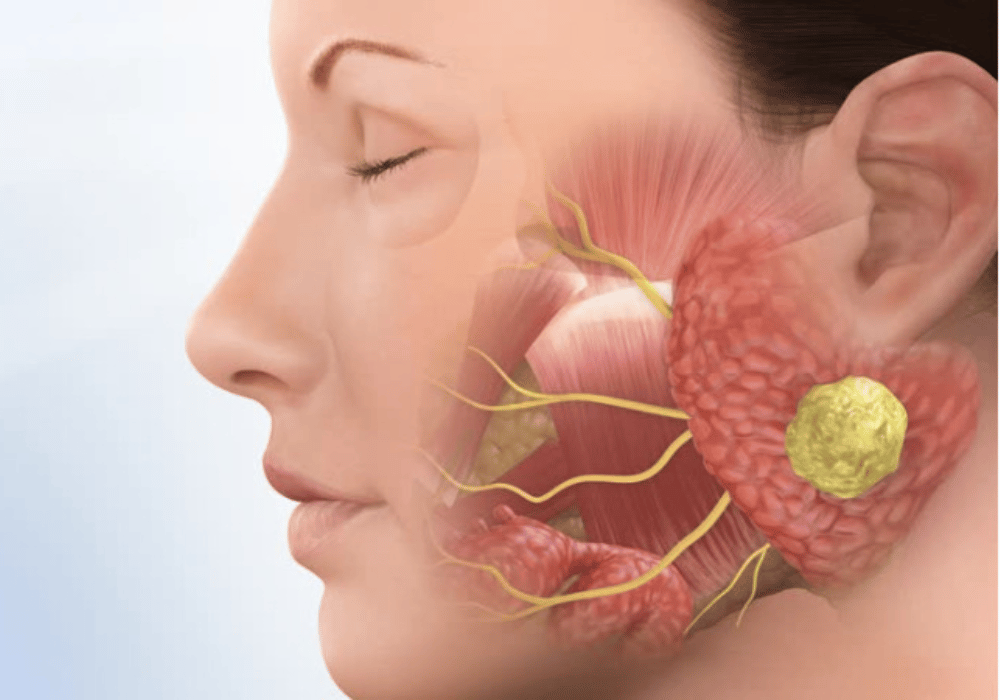Salivary Gland Benign Tumours

Salivary Gland Benign Tumors Services at Team Reconface
Team Reconface specializes in the diagnosis and management of benign tumors affecting the salivary glands. Our experienced oral and maxillofacial surgeons, in collaboration with other specialists, provide comprehensive care to address these tumors, ensuring optimal outcomes and preserving the function of the salivary glands.
Common Benign Tumors of the Salivary Glands:
Pleomorphic Adenoma:
- Pleomorphic adenoma is the most common benign tumor of the salivary glands. It typically occurs in the parotid gland and can also affect the submandibular gland and minor salivary glands. Surgical removal is the standard treatment.
Warthin Tumor (Papillary Cystadenoma Lymphomatosum):
- Warthin tumor is a benign salivary gland tumor that often occurs in the parotid gland. It is more common in men and is associated with smoking. Surgical excision is the primary treatment.
Monomorphic Adenomas:
- Monomorphic adenomas are a group of benign tumors that exhibit uniform cellular composition. Treatment involves surgical removal, and recurrence is uncommon.
Myoepithelioma:
- Myoepitheliomas are rare benign tumors that arise from myoepithelial cells in the salivary glands. Surgical excision is the primary treatment.
Basal Cell Adenoma:
- Basal cell adenomas are rare benign tumors, often found in the parotid gland. Surgical removal is the preferred treatment.
The Treatment Process for Salivary Gland Benign Tumors:
Comprehensive Evaluation:
- A thorough evaluation, including imaging studies and biopsy, is conducted to accurately diagnose the benign salivary gland tumor.
Consultation and Treatment Planning:
- Patients are actively involved in the consultation process, where treatment options, potential benefits, and risks are discussed. The treatment plan is tailored to the individual’s specific condition.
Surgical Excision:
- Surgical removal of the benign tumor is often the primary treatment. The approach may vary based on the location and size of the tumor. Minimally invasive techniques may be considered when appropriate.
Pathological Examination:
- The excised tumor is sent for pathological examination to confirm the diagnosis and ensure complete removal.
Follow-Up and Monitoring:
- Regular follow-up appointments are scheduled to monitor recovery, address any concerns, and assess for recurrence.
Why Choose Team Reconface for Salivary Gland Benign Tumors?
Specialized Surgeons: Our oral and maxillofacial surgeons have extensive experience in the surgical management of salivary gland tumors, ensuring precision and optimal outcomes.
Diagnostic Expertise: Accurate diagnosis is crucial for determining the nature of the tumor and planning the most appropriate treatment. Our team utilizes advanced imaging and diagnostic techniques.
Minimally Invasive Techniques: Whenever possible, we employ minimally invasive surgical techniques to minimize scarring and promote quicker recovery.
Collaborative Care: We collaborate with other specialists, including radiologists and pathologists, to ensure a comprehensive and accurate approach to the diagnosis and treatment of benign salivary gland tumors.
No, many salivary gland tumors are benign. Accurate diagnosis through biopsy and imaging studies is essential to determine the nature of the tumor.
Pleomorphic adenoma is typically treated with surgical removal. The goal is to completely excise the tumor while preserving the function of the salivary gland.
While recurrence is uncommon for many benign tumors, regular follow-up appointments are important to monitor for any signs of recurrence.
Surgical removal is often the primary treatment, but the specific approach may vary based on factors such as tumor size and location. In some cases, minimally invasive techniques may be considered.
Recovery time varies depending on the type of surgery and the individual's overall health. Patients receive postoperative care instructions to support healing.
Meet Our Surgeons
Opening Hours
Mon – Fri
08.00 -18.00
Sat – Sun
09.00 -15.00
Make Your Appointment

MDS, Oral & Maxillofacial Surgery Travel Fellowship (AOCMF, Germany)
Special Interest in: Oral Cancer, Orthognathic Surgery & Facial Deformity Correction

MDS, Oral & Maxillofacial Surgery Travel Fellowship, AOCMF(Beijing) Fellowship (AIMS, Kochi)
Special Interest In: Facial Reconstruction, Oral Cancer, Facial Trauma & Orthognathic Surgery

MDS, Oral & Maxillofacial Surgery
Special Interest In: Facial Reconstruction, Oral Cancer, Facial Trauma & Orthognathic Surgery
